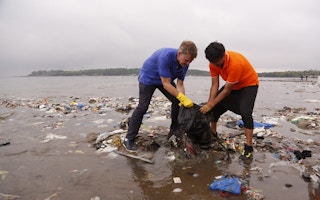The United Nations Environment Programme (UNEP) launched a global campaign last month aimed at eliminating two of the chief sources of ocean trash by 2022: microplastics frequently used in cosmetics and single-use plastic products like shopping bags.
According to a report by the Ellen MacArthur Foundation released last year, more than eight million metric tons of plastic finds its way into the oceans annually, which is roughly equivalent to dumping an entire garbage truck of plastic into the oceans every minute.
If we continue with business as usual, the report found, the amount of plastic waste finding its way into Earth’s oceans could jump to two garbage trucks per minute by 2030, and four per minute by 2050 — at which point the plastic in our oceans would weigh more than all fish combined and some 99 per cent of seabirds will have ingested some plastic trash they found bobbing in the ocean.
UNEP launched its Clean Seas campaign to try and reverse that trend by pushing governments to adopt policies that reduce consumption of plastic products, urging companies to minimise their use of plastic packaging, and working to change the consumer habits that lead to so much plastic being dumped into our seas.
“
Plastic pollution is surfing onto Indonesian beaches, settling onto the ocean floor at the North Pole, and rising through the food chain onto our dinner tables. We’ve stood by too long as the problem has gotten worse. It must stop.
Erik Solheim, head, UN Environment Programme
It’s not just seabirds’ health at stake. More than 600 marine wildlife species are impacted by litter in the oceans, per UNEP.
Fifteen per cent of those species that are harmed by ingesting or becoming entangled in ocean trash are already endangered.
Ten different countries had already joined the campaign at the time of its launch, UNEP said.
Indonesia, for instance, pledged to reduce marine litter by 70 per cent by 2025, while Uruguay announced a tax on single-use plastic bags slated to take effect later this year. Costa Rica, for its part, said it planned to reduce single-use plastic through better waste management and education.
“Costa Rica recognises the risks and damage caused by the effects of single-use plastic and non-recoverable micro plastics on the marine environment,” Edgar Gutiérrez-Espeleta, the country’s Minister of Environment and Energy, said in a statement.
“We strongly favour the engagement of all relevant stakeholders, including civil society, private sector and all citizens to support national and global efforts. Only through a real and active engagement of all of us, with the help of dynamic partnerships, we will be able to effectively combat marine litter.”
The other countries already onboard with the Clean Seas campaign include Belgium, France, Grenada, Norway, Panama, Saint Lucia, and Sierra Leone.
Some private sector actors have also committed to tackling the issue by addressing the contribution made by their supply chains. The most prominent example is DELL Computers, which has created a commercial-scale program to use plastic removed from the sea near Haiti in its product packaging.
“DELL is committed to putting technology and expertise to work for a plastic-free ocean,” DELL Vice President for Global Operations Piyush Bhargava said in a statement. “Our new supply chain brings us one step closer to UN Environment’s vision of Clean Seas by proving that recycled ocean plastic can be commercially re-used.”
Singer-songwriter Jack Johnson is one of several celebrities pledging their support for the Clean Seas campaign.
Johnson said he will encourage venues he’s playing as part of a 2017 summer tour to reduce single-use plastics, and he’s also promoting a new documentary called The Smog of the Sea, which looks at the impacts of the more than 50 trillion microplastic particles currently polluting our oceans.
As the campaign progresses, UNEP plans to continue to highlight initiatives undertaken by countries and businesses to rein in the rate at which our plastic pollution is entering the world’s oceans.
There have already been a number of ambitious measures promoted by the campaign since its launch, such as the ban on single-use plastic bags announced by the governments of Kenya and Tunisia, and the prohibition on the use of plastic microbeads in all cosmetics and personal care items announced by the environment minister of New Zealand.
“It is past time that we tackle the plastic problem that blights our oceans,” UNEP head Erik Solheim said in a statement.
“Plastic pollution is surfing onto Indonesian beaches, settling onto the ocean floor at the North Pole, and rising through the food chain onto our dinner tables. We’ve stood by too long as the problem has gotten worse. It must stop.”
This story was published with permission from Mongabay.com










